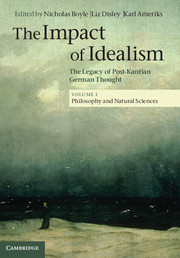Book contents
- Frontmatter
- Contents
- List of Illustrations
- List of Contributors
- Acknowledgements
- List of Abbreviations
- Foreword
- General introduction: the eighteenth and nineteenth centuries
- General introduction: the twentieth and twenty-first centuries
- Introduction: Idealism in the natural sciences and philosophy
- 1 Philosophy of natural science in Idealism and neo-Kantianism
- 2 The impact of German Idealism and Romanticism on biology in the nineteenth century
- 3 The unconscious: transcendental origins, Idealist metaphysics and psychoanalytic metapsychology
- 4 Nietzsche, Kant and teleology
- 5 Transcendental idealism, phenomenology and the metaphysics of intentionality
- 6 Heidegger and the impact of idealism
- 7 French Hegelianism and anti-Hegelianism in the 1960s: Hyppolite, Foucault and Deleuze
- 8 Scottish Idealism
- 9 ‘My station and its duties’: social-role accounts of obligation in Green and Bradley
- 10 Idealism and the origins of analytic philosophy1
- 11 Idealism and Pragmatism: the inheritance of Hegel's concept of experience
- 12 Reason's form
- Bibliography
- Index
- References
General introduction: the eighteenth and nineteenth centuries
Published online by Cambridge University Press: 05 December 2013
- Frontmatter
- Contents
- List of Illustrations
- List of Contributors
- Acknowledgements
- List of Abbreviations
- Foreword
- General introduction: the eighteenth and nineteenth centuries
- General introduction: the twentieth and twenty-first centuries
- Introduction: Idealism in the natural sciences and philosophy
- 1 Philosophy of natural science in Idealism and neo-Kantianism
- 2 The impact of German Idealism and Romanticism on biology in the nineteenth century
- 3 The unconscious: transcendental origins, Idealist metaphysics and psychoanalytic metapsychology
- 4 Nietzsche, Kant and teleology
- 5 Transcendental idealism, phenomenology and the metaphysics of intentionality
- 6 Heidegger and the impact of idealism
- 7 French Hegelianism and anti-Hegelianism in the 1960s: Hyppolite, Foucault and Deleuze
- 8 Scottish Idealism
- 9 ‘My station and its duties’: social-role accounts of obligation in Green and Bradley
- 10 Idealism and the origins of analytic philosophy1
- 11 Idealism and Pragmatism: the inheritance of Hegel's concept of experience
- 12 Reason's form
- Bibliography
- Index
- References
Summary
I
Between 1781, when Kant's Critique of Pure Reason appeared, and 1807, when Hegel published the Phenomenology of Spirit, an intellectual revolution took place in Germany as long-lasting and widespread in its effects as the contemporary political revolution in France. Unlike the French Revolution, however, the German revolution has been underestimated and the extent and degree of its influence inadequately recognised, even in Germany, where its role in the cultural history of the nation overshadows and distorts the appreciation of its international significance. Yet throughout the European and American worlds and, by extension, wherever Euro-American culture has left its mark, Kant's critique and reappraisal of the Enlightenment consensus, and the response to his challenge by the next generation of German thinkers, have profoundly affected theory and practice in most of the fields studied by the humanities and social sciences. Political thought was given a new direction by Kant and the post-Kantians through a new understanding of the State and of the foundations of law, and social and critical theory is largely a post-Kantian invention. In its transformation by Marx, Hegel's social thinking determined the political landscape of the twentieth century and still provides the ideology through which one fifth of the human race is at least nominally ruled. Kant, and Hegel's disagreement with Kant, gave later moral and religious thinking some of its canonical problems and most powerful concepts – autonomy, universalisability, ethical life (Sittlichkeit), and (world-)spirit, for example. Aesthetics, itself a disciplinary innovation of eighteenth-century German academic Enlightenment, was almost immediately refounded by Kant's followers and, together with their new and immensely persuasive concept of ‘Art’, has influenced the understanding, the institutionalisation, and thus the practice, of literature, music, the visual arts and architecture, down to the present day. Even in the biological sciences the monistic and evolutionary tendencies and morphological interests of the post-Kantians prepared the way for the now all-powerful Darwinian model, while their various pioneering formulations of the concept of the unconscious mind bore fruit in the later development of depth psychology. It goes without saying that across the world much of academic philosophy still devotes itself to what are essentially Kantian and post-Kantian questions, and even the philosophy practised in Anglo-American universities sometimes proves on close inspection to incorporate elements that derive from the same source.
Information
- Type
- Chapter
- Information
- The Impact of IdealismThe Legacy of Post-Kantian German Thought, pp. 1 - 40Publisher: Cambridge University PressPrint publication year: 2013
